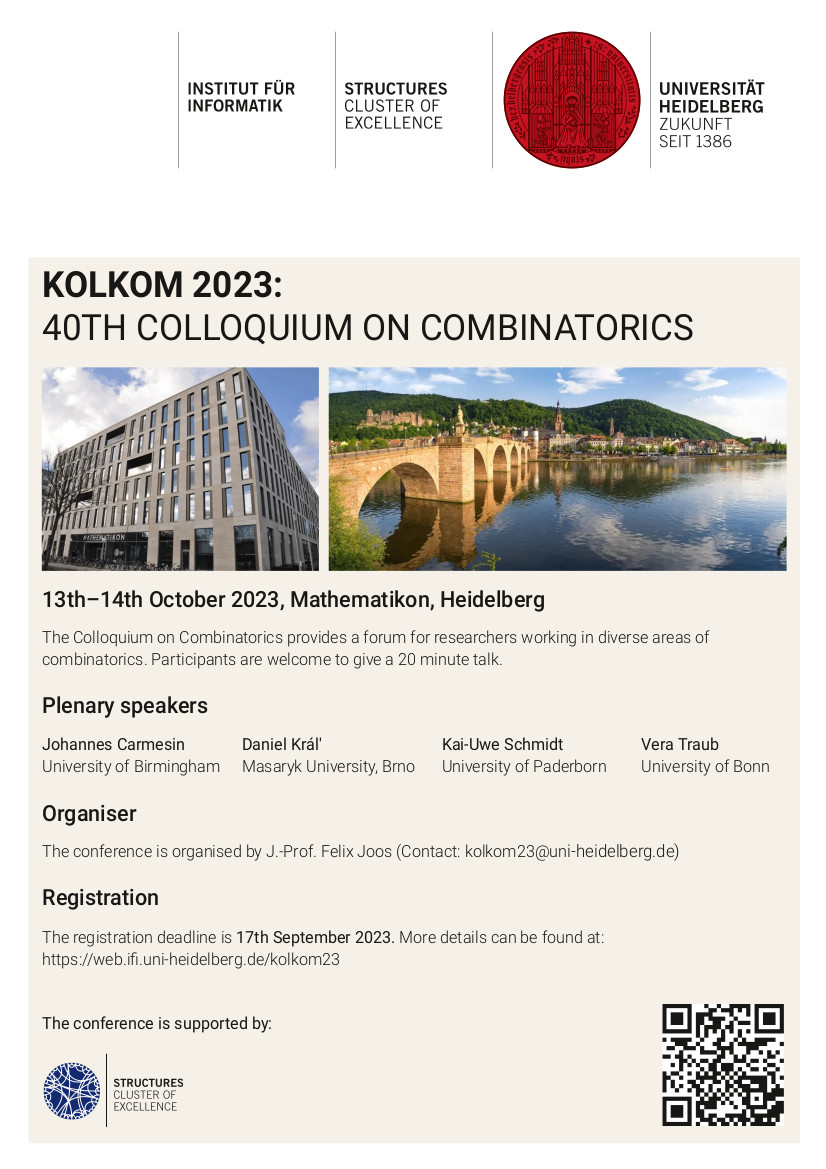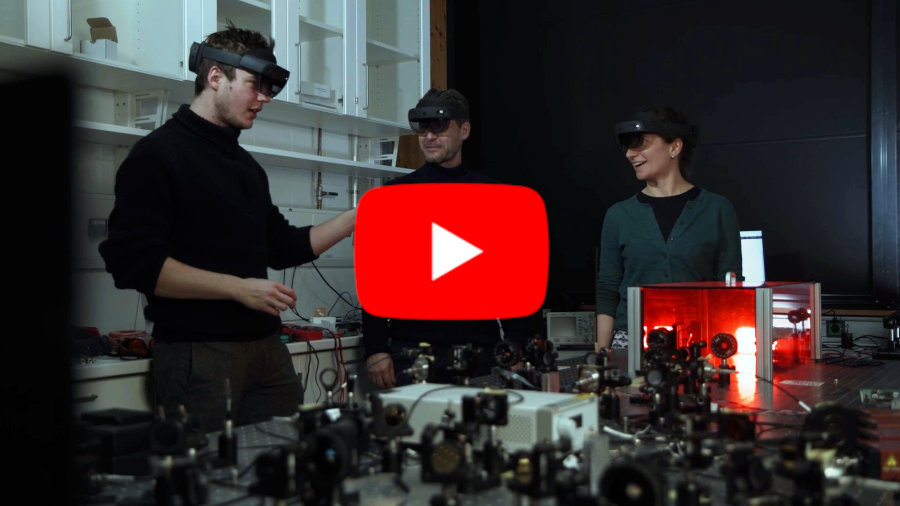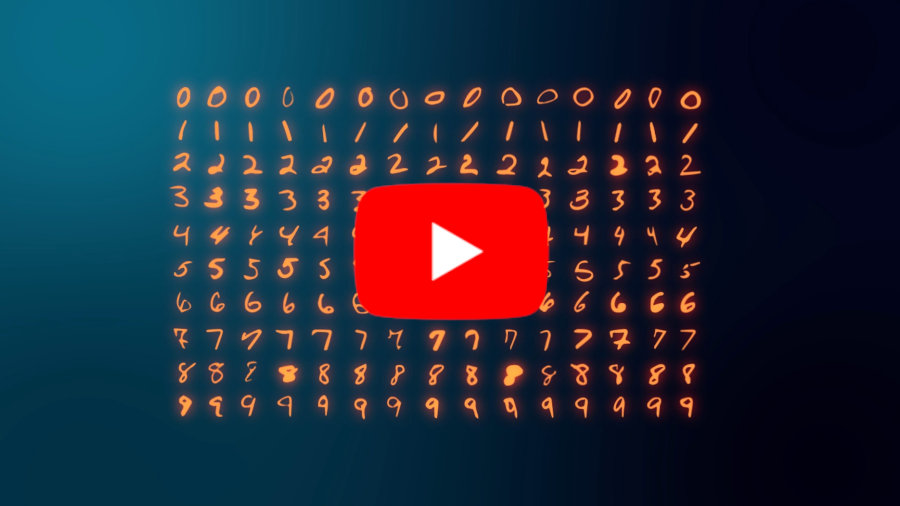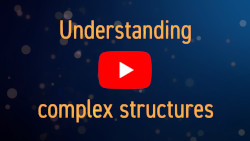Newsroom
Stay informed with our latest news and announcements on this page. For more in-depth content, we also encourage visitors to explore our bimonthly STRUCTURES Newsletter magazine, which features a variety of articles, interviews with members, and background information on our latest research and activities.
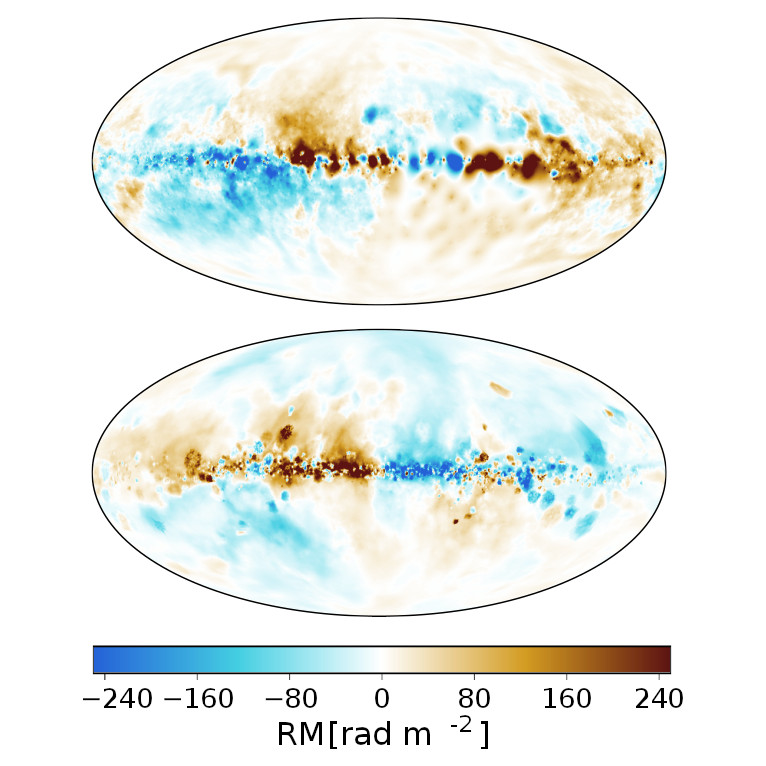 All-sky Faraday RM map of the Milky Way (top) as presented in Hutschenreuter+ 2020 compared to one of our computed maps (bottom) based on the cosmological galaxy simulation and a synthesized cluster population. We note that both maps show a comparable distribution of small-scale to large-scale features.
All-sky Faraday RM map of the Milky Way (top) as presented in Hutschenreuter+ 2020 compared to one of our computed maps (bottom) based on the cosmological galaxy simulation and a synthesized cluster population. We note that both maps show a comparable distribution of small-scale to large-scale features.STRUCTURES Scientists Reproduce Milky Way’s Magnetic Field Structure in Unprecedented Detail Using Galaxy Simulations.
Magnetic fields play a significant role in shaping the evolution of the interstellar medium and the process of star formation. In their new study published in Nature Astronomy, an international and interdisciplinary research team led by STRUCTURES scientists from Comprehensive Project (CP) 1 have derived an unprecedented first-principles prediction of the Milky Way's magnetic field structure. The scientists utilized cosmological magneto-hydrodynamic simulations of the Milky Way's formation, augmented with a new star-cluster population-synthesis model and detailed radiative transfer calculations to simulate the Faraday rotation measure – a primary observable signal encoding magnetic field topology and strength within polarized light. The results reproduce the observations of the Galaxy not only on large scales, but also replicate the intricate nuances of local individual star-forming clouds. Remarkably, the results emphasize the paramount influence of the Local Bubble — a region encompassing our Sun — whose rotation measure signal prevails across vast regions of the sky. This comprehensive analysis bridges a gap between observations and theoretical models, offering crucial insights into the Milky Way's origin and long-term evolution.
Weblinks:
- Original Publication: Reißl, S., Klessen, R.S., Pellegrini, E.W., Rahner, D., Pakmor, R., Grand, R., Gómez, F., Marinacci, F., Springel, V. Nat Astron (2023). https://doi.org/10.1038/s41550-023-02053-2
- Star Formation Group led by Ralf Klessen at ITA/ZAH: Webpage
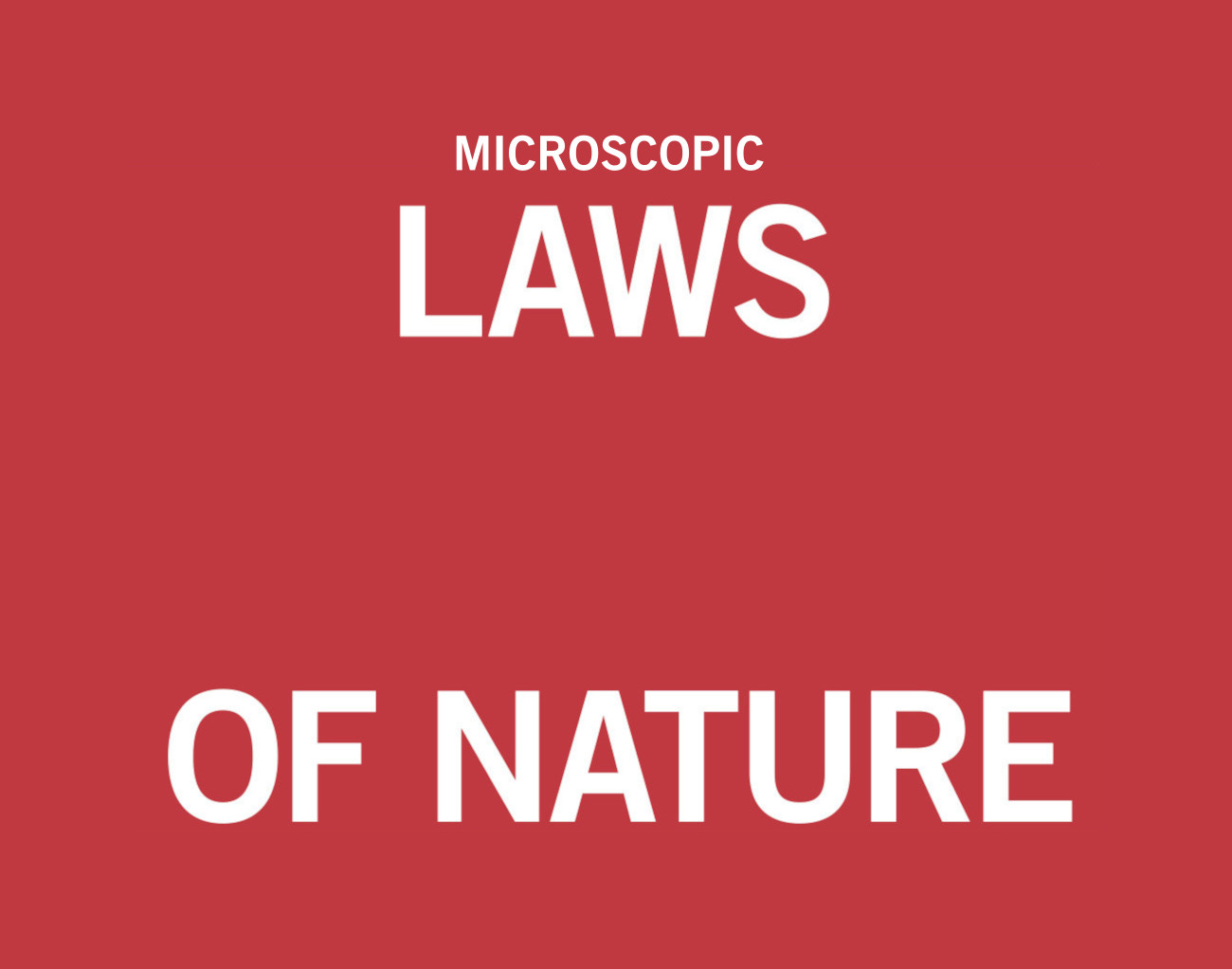 The interplay between weak and strong elements or interactions in nature and society is the focus of the new issues of the RUPERTO CAROLA research magazine.
The interplay between weak and strong elements or interactions in nature and society is the focus of the new issues of the RUPERTO CAROLA research magazine.The properties of materials around us are governed by the laws of quantum mechanics. These laws describe how electrons and nuclei form atoms that assemble into molecules and solids. However, while it is possible to describe and predict the properties of a simple molecule or crystal using the microscopic laws of quantum mechanics, it is much more difficult to predict the behaviour of complex systems composed of many (1023) particles. This is because, at each complexity level, new phenomena can emerge that are not intuitively obtained – and cannot simply be extrapolated – from the underlying microscopic laws. These emergent phenomena arise from competing interactions between the constituents that form the material.
In the most recent edition of the RUPERTO CAROLA research magazine, Maurits Haverkort from STRUCTURES delves into the challenge of comprehending and predicting the characteristics of quantum materials with competing local and itinerant interactions. The article sheds light on innovative methodologies, developed within STRUCTURES, to grasp the delicate balance between these interactions, revealing emergent properties. Being able to understand and predict these properties allows for advances in a variety of applications and fields. For instance, understanding the chemistry and physics of Actinides is important for the safe storage of nuclear waste, or comprehending how such elements bind to different ligands, which could be useful for future applications in nuclear medicine.
Article in RUPERTO CAROLA:
We are happy to announce that the 40th Colloquium on Combinatorics (Kolkom 2023) is going to take place in Heidelberg, organized by Felix Joos ( STRUCTURES, Heidelberg) and supported by the STRUCTURES Cluster of Excellence. The conference aims to provide a forum for researchers working in diverse areas of combinatorics. The plenary speakers will be Johannes Carmesin (Birmingham), Daniel Král' (Brno), Kai-Uwe Schmidt (Parderborn) and Vera Traub (Bonn).
The conference will take place from Oct 13 to 14 at the Mathematikon in Heidelberg. The registration deadline is Sep 17. More details on the registration and venue can be found at the conference webpage:
STRUCTURES Short Film 5: How can complex physical structures be used as a resource for computation?
Our world consists of complex physical structures, spanning from quantum systems and cells to waterfalls and the cosmos in its entirety. Various fundamental insights gained from observations of those intricate structures can be used as a resource for novel approaches of computation. Any structure, whether it is a mug, atoms, light rays or a car, can be used as a computational structure. In the STRUCTURES Cluster, we use the learnings and know-how from our own experiments and research to drive new frontiers in computational innovation within our laboratories – all powered by the collaborative synergy of unique expertise from diverse disciplines.
Video link (YouTube):
STRUCTURES: How can complex physical structures be used as a resource for computation?
STRUCTURES Short Film 4: How can we efficiently and reliably identify structures in large datasets?
In a data-abundant world, the challenge of discerning meaningful patterns becomes ever more crucial. One of the four key research questions of STRUCTURES is how to reliably and efficiently uncover structures in large datasets. Our team of researchers trains specialized unsupervised neural networks to tackle the complexity of structure discovery. These AI algorithms autonomously construct what we term as feature spaces — an abstraction that comes to life through a relatable example: How do people's handwriting styles differ? Our networks possess the ability to learn and interpret distinct handwriting styles. The foundational concepts underlying these abilities can be applied to various structure discovery tasks in diverse fields, including disciplines such as medicine.
Video link (YouTube):
STRUCTURES: How can we efficiently and reliably identify structures in large datasets?
STRUCTURES Short Film 3: What are deep new relations between mathematical & physical structure?
"This is a coffee mug. But for a scientist, it is so much more…" Join us on a fascinating tour through the world of geometry & topology, where intriguing links emerge between physics & mathematics. The study of these connections from an interdisciplinary angle allows us to advance understanding in both disciplines, surpassing what each discipline can achieve independently. The STRUCTURES Cluster in Heidelberg offers a unique environment for scientists from diverse backgrounds to interact and collaborate. Together, our researchers synergize their expertise to drive rapid advancements, pushing the boundaries of knowledge and understanding.
Video link (YouTube):
STRUCTURES: What are deep new relations between mathematical and physical structure?
Complicated structures emerge from simple laws applied to very general conditions. Mathematics plays a unifying role in providing very similar methods for cosmology and quantum fields. Our latest film, available on the STRUCTURES YouTube channel, underlines the unique interdisciplinary collaboration within the STRUCTURES Cluster of Excellence, in which theoretical and experimental methods are linked:
Video link (YouTube):
STRUCTURES: Understanding Complex Structures
